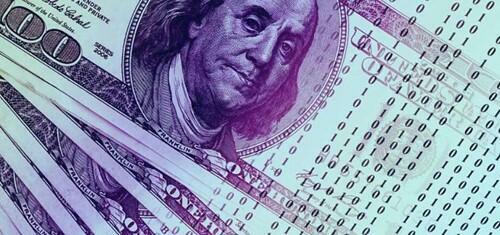
Authored by Adam Dick via The Ron Paul Institute,
A poll from the Cato Institute indicates that, while about half of Americans do not have an opinion regarding whether the Federal Reserve should “begin offering a government-issued digital currency, called a ‘central bank digital currency’ (CBDC),” among those with an opinion on the matter over twice as many - 34 percent of poll participants - oppose the prospect as support it - 16 percent.
This result of the poll conducted from February 27 through March 8 in collaboration with YouGov is promising for Americans concerned about the threat a CBDC, which the Federal Reserve and big financial companies have been testing in preparation for its potential introduction, poses to freedom and privacy in America.
The poll results further indicate that, if Americans can be educated about the abusive government powers a CBDC can advance, many Americans currently undecided regarding the introduction of a CBDC will see good reason to oppose it. Emily Ekins and Jordan Gygi wrote in their May 31 in-depth Cato Institute article concerning the poll results:
Overwhelming majorities would oppose the adoption of a CBDC if it meant that the government could control what people spend their money on (74%), that the government could monitor their spending (68%), that a CBDC would abolish all U.S. cash (68%), that a CBDC would attract cyberattacks (65%), that the government could charge a tax on those who don’t spend money during recessions (64%), or that the government could freeze the digital bank accounts of political protesters (59%). Americans were marginally opposed (52%) if a CBDC could cause some people to stop using private banks, resulting in some banks going out of business.
The candidates now in second place in the Republican and Democratic presidential primaries - Ron DeSantis and Robert F. Kennedy, Jr. - appear to be in the anti-CBDC camp.
Hopefully, we will see more and more politicians joining them over the coming months in standing up against this threat posed by the Federal Reserve and US government.
Meanwhile, it is also important that Americans across the country educate the people they come into contact with about why a CBDC in America is unacceptable.
The new poll from the Cato Institute suggests that many people will be receptive to this message.
Authored by Adam Dick via The Ron Paul Institute,
A poll from the Cato Institute indicates that, while about half of Americans do not have an opinion regarding whether the Federal Reserve should “begin offering a government-issued digital currency, called a ‘central bank digital currency’ (CBDC),” among those with an opinion on the matter over twice as many – 34 percent of poll participants – oppose the prospect as support it – 16 percent.
This result of the poll conducted from February 27 through March 8 in collaboration with YouGov is promising for Americans concerned about the threat a CBDC, which the Federal Reserve and big financial companies have been testing in preparation for its potential introduction, poses to freedom and privacy in America.
The poll results further indicate that, if Americans can be educated about the abusive government powers a CBDC can advance, many Americans currently undecided regarding the introduction of a CBDC will see good reason to oppose it. Emily Ekins and Jordan Gygi wrote in their May 31 in-depth Cato Institute article concerning the poll results:
Overwhelming majorities would oppose the adoption of a CBDC if it meant that the government could control what people spend their money on (74%), that the government could monitor their spending (68%), that a CBDC would abolish all U.S. cash (68%), that a CBDC would attract cyberattacks (65%), that the government could charge a tax on those who don’t spend money during recessions (64%), or that the government could freeze the digital bank accounts of political protesters (59%). Americans were marginally opposed (52%) if a CBDC could cause some people to stop using private banks, resulting in some banks going out of business.
The candidates now in second place in the Republican and Democratic presidential primaries – Ron DeSantis and Robert F. Kennedy, Jr. – appear to be in the anti-CBDC camp.
Hopefully, we will see more and more politicians joining them over the coming months in standing up against this threat posed by the Federal Reserve and US government.
Meanwhile, it is also important that Americans across the country educate the people they come into contact with about why a CBDC in America is unacceptable.
The new poll from the Cato Institute suggests that many people will be receptive to this message.
Loading…







